
On October 29, 2022, Business+ Young Scholar Forum | Season 01 has been kick-started! The first Episode (E01) focused on the theme of Data-Driven Optimization. Seven Scholars from Duke University, the University of Chicago, Rutgers, The State University of New Jersey, the City University of Hong Kong, and Zhejiang University have been invited to share their research.
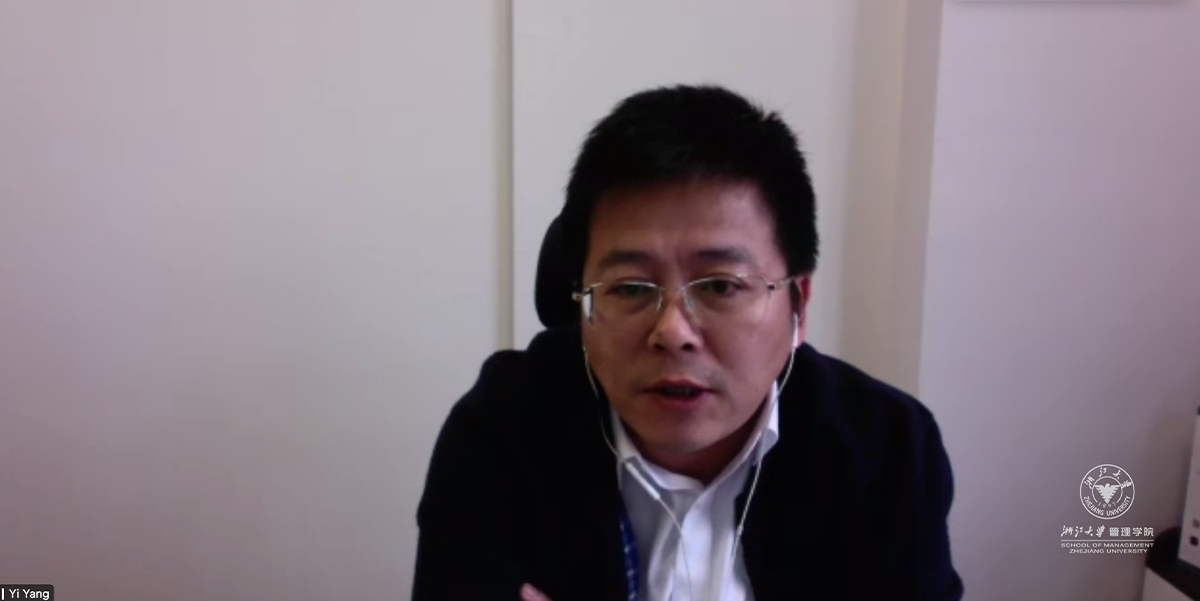
On behalf of the organizer, Prof. Yi Yang, Associated Dean of School of Management at Zhejiang University (ZJU-SOM), delivered his opening address, welcoming all the guests who participating this forum, and expressing gratitude to the speakers who were going to give keynote speech at the forum. After the brief speech, the forum officially kicked off. The morning session was hosted by Assistant Prof. Haotian Song from ZJU-SOM, while, the afternoon session was hosted by Dr. Quan Yuan, the tenured associate professor from ZJU-SOM, and Dr. Zheng Cui, assistant professor from ZJU-SOM.

The first keynote speech was given by Prof. Xiqun Chen from the College of Civil Engineering and Architecture, Zhejiang University. His topic was Optimizing On-Demand Ride-Sourcing Services: Game Theory and Agent-Based Modeling. From the empirical study, Prof. Chen found that inactive driver with high opportunity costs is more sensitive to the additional subsidy and their supply elasticities are approximately twice of active drivers. Besides, the larger scale of a city, the less elastic it is likely to be. Moreover, compared with the fixed pricing strategy, the experimental results on a real-world urban network show that dynamic pricing raises the platforms profit to 1.25 times, and spatial–temporal pricing even raises it to 1.85 times.
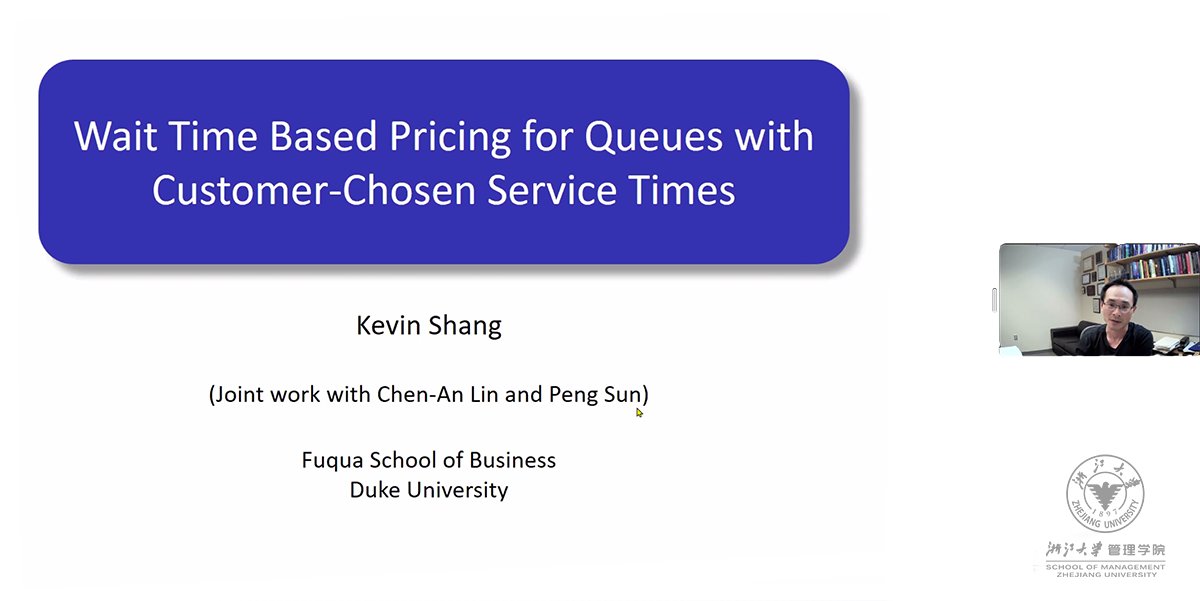
Prof. Kevin Shang from Duke University gave a talk on the topic of Wait Time-Based Pricing for Queues with Customer-Chosen Service Times. This study is proposed as an example of a fast-charging station characterized by a price based on the system wait time. Aiming to address questions such as What is the optimal dynamic pricing policy under this model? What is the benefit of dynamic pricing over static pricing policy? What is the impact of social welfare under the optimal dynamic revenue-maximizing pricing policy?
It is found that the optimal dynamic price rate policy is not monotonic in terms of wait time, and in addition to the congestion effect that has been studied, a compensation effect is found, whereby the service provider should lower the price rate when the wait time is longer than a threshold. Compared with the prevalent static pricing policy, the optimal dynamic pricing policy improves the objective value through admission control, which, in turn, increases the utilization of the server. In a numerical study, the revenue-maximizing pricing policy outperforms the best static pricing policy, especially when the arrival rate is low, and customers are impatient. Moreover, the revenue-maximizing policy also improves social welfare over the static pricing policy in most of the tested cases.

Prof. Yao Zhao from Rutgers, The State University of New Jersey shared with us how to use data analysis methods to identify and discover management problems in the supply chain, including inventory analysis, procurement analysis, competitive intelligence, etc. His speech topic was Supply Chain Analytics-From Problem Solving to Problem Discovery. Prof. Yao shared his understanding of the inventory problem: which industries are the inventory essential for . He analyzed KPI data of many industries and emphasized the importance of inventory in the retail industry and real estate industries. He also points out that the purpose of supply-side structural reform is to remove the real estate inventory.
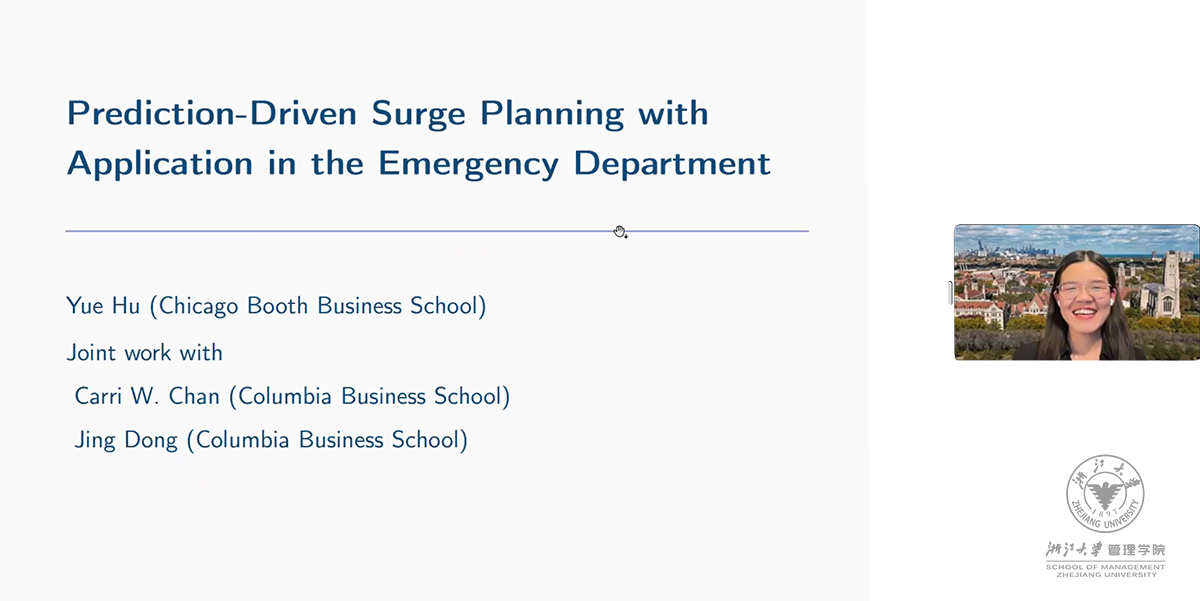
Dr. Yue Hu, from the University of Chicago, shared with us a two-period prediction-driven model for emergency department nurse staffing. This research quantifies the benefit of having the ability to use the more expensive surge staffing and identifies the importance of balancing demand uncertainty versus demand stochasticity. A near-optimal two-stage staffing policy that is straightforward to interpret and implement is also proposed. Finally, this research develops a unified framework that combines parameter estimation, real-time demand forecasts, and capacity sizing in the ED. High-fidelity simulation experiments for the ED demonstrate that the proposed framework can reduce annual staffing costs by 11%–16% while guaranteeing timely access to care.
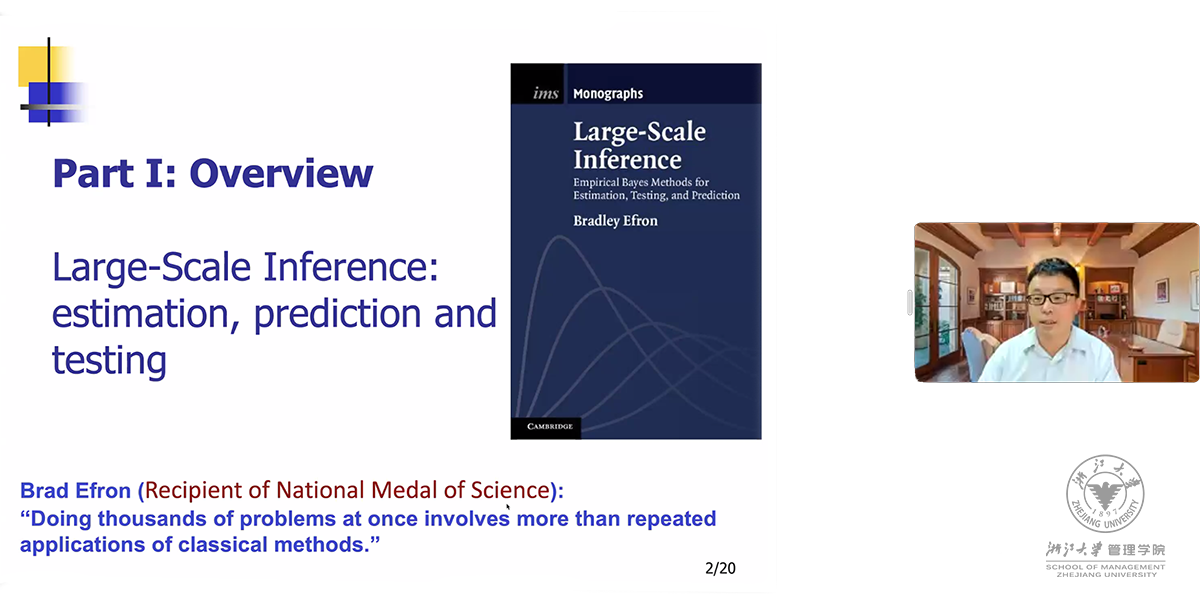
Prof. Wenguang Sun is from the Center for Data Science, Zhejiang University. His topic was Nonparametric Empirical Bayes Estimation On Heterogeneous Data. Prof. Sun briefly describes the characteristics of large-scale statistical inference: high-dimensional and sparse structure. A problem may find an optimal solution, but thousands of the same problem are not simply thousands of repeated optimal solutions, and multiplicity effects can produce many dramatic results. Therefore, in large-scale statistical inference, it is necessary to do a good job in false discovery rate control and selection bias correction. Then Prof. Sun introduces large-scale high-dimensional heterogeneous data estimation method proposed by his team: Nonparametric Empirical Bayes Structural Tweedie (NEST). Their theoretical results show that NEST has strong asymptotic properties without requiring explicit assumptions about the prior. Extensions to other two-parameter members of the exponential family are discussed. Simulation studies show that NEST outperforms competing methods, with much efficiency gains in many settings.
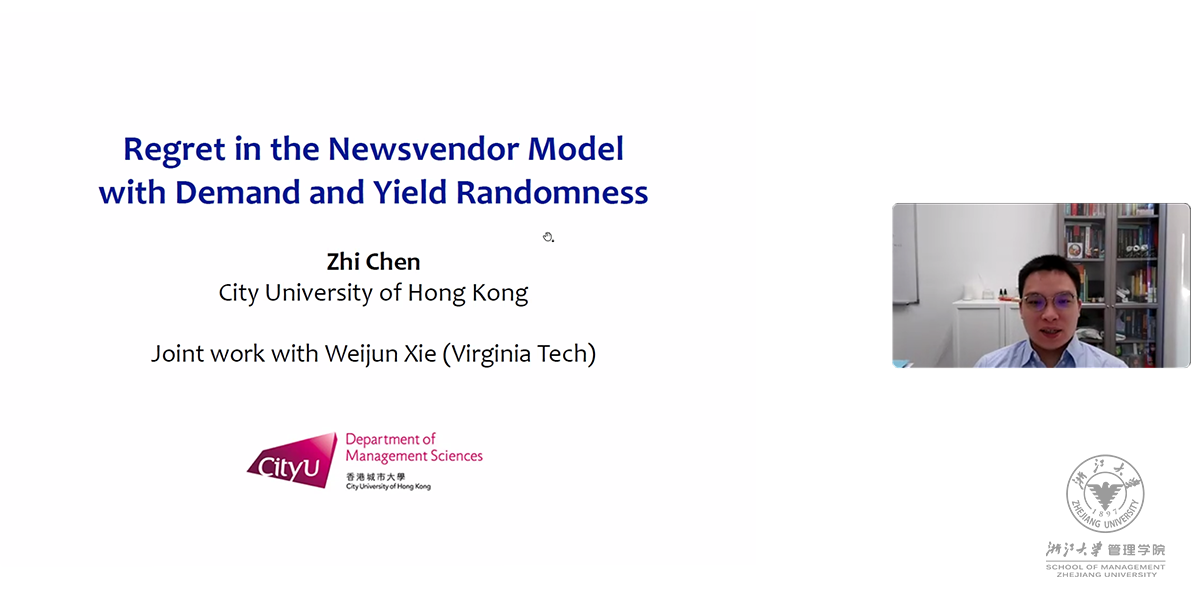
Dr. Zhi Chen is the assistant professor from City University of Hong Kong and his research is about “Regret in the Newsvendor Model with Demand and Yield Randomness”. Dr. Chen’s team found the optimal order quantity can be determined via an efficient golden section search. They also extend the analysis to the Hurwicz criterion model, which generalizes the popular albeit pessimistic maximin model (maximizing the worst-case expected profit) and its (less noticeable) more optimistic counterpart—the maximax model (maximizing the best-case expected profit). Besides, the research presents numerical comparisons of the data-driven minimax regret model with data-driven models based on the Hurwicz criterion and with a minimax regret model based on partial statistical information on moments and finds that their model performs much better.

The last keynote speech was delivered by Dr. Shouchang Chen, assistant professor of ZJU-SOM. His topic was Managing the Personalized Order-Holding Problem in Online Retailing. A significant percentage of online consumers place consecutive orders within a short duration. To reduce the order-fulfillment cost, an online retailer may consolidate consecutive orders from the same consumer. Dr. Chen investigates how long the retailer should hold the consumer’s orders before sending them to a third-party logistics provider for processing. In this order-holding problem, we optimize the holding time to balance the order-fulfillment cost and the potential delay in delivery. Numerical experiments show that the personalized threshold-type policy outperforms two commonly-used benchmarks by having fewer order arrangements or shorter holding times. At the same time, personalized order retention decisions are more valuable to "enterprise" customers. In addition, research suggests a higher threshold for consumers who are more likely to place consecutive orders within a short duration. The consumers’ demographic information has a significant effect on the threshold.

The forum ended up successfully with the closing remark by Prof. Weihua Zhou, the Director of International Research Center for Data Analysis and Management of Zhejiang University. Once again Prof. Zhou expressed his heartfelt thanks to all the guests for their active participation, and hoped that everyone will continually support ZJU-SOM and its Management Science and Engineering discipline.











